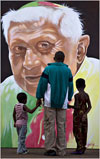
Today, Pope Benedict XVI began a six-day trip to Angola and Cameroon, his first trip to the African continent in his capacity as leader of the Catholic Church. Pope Benedict has been criticized for being “Eurocentric,” a charge that would be hard to level against his predecessor, who traveled numerous times to Africa. However, given that, as the New York Times reported yesterday, there are roughly 158 million Catholics in Africa, and that by 2025, “one-sixth of the world’s Catholics, or about 230 million, are expected to be African,” the Catholic Church has rightly decided to focus more efforts on the future of Catholicism on the continent. The theme of the Church’s annual month-long synod in Rome, a meeting of the world’s bishops, is “The Church in Africa at the Service of Reconciliation, Justice and Peace.”
In a recent address at the Vatican, the Pope said of his upcoming trip:
I intend to ideally embrace the entire continent, its thousand differences, its deep religious soul, its ancient cultures, its weary path of development and reconciliation, its grave problems, its painful wounds and its enormous potential and hope…In particular, I am thinking of the victims of hunger, sickness, injustices, fratricidal conflicts and every form of violence that unfortunately continues.
In Angola and Cameroon, two nations with strong Catholic populations, the Pope is likely to see some of the “painful wounds” he referred to; the two nations also highlight, in a variety of ways, some of the various obstacles that the Catholic Church may be attempting to combat on the continent. For example, in Cameroon, the struggle between Christianity and Islam is intense. In neighboring Nigeria, tensions are even higher, and the country’s “Middle Belt” has been the site of violent faith-driven clashes between community members (Eliza Griswold skillfully described the ongoing religious in Nigeria in this piece for the Atlantic a year ago).
Reuters reports that in Cameroon, a virtually authoritarian state whose president changed the constitution last year to allow himself to be “President for life,” the government is attempting to sweep some of the nation’s burning problems under the rug in advance of the Pope’s visit.
The Pope’s visit to Africa comes at a critical time in Sudan, and the Catholic community has been very vocal about the atrocities occurring in Darfur. As the leader of the Catholic community, Pope Benedict is in a unique position to energize and support the existing group of faith-based activists who have compelled to action by the Darfur crisis. The Pope also wields an important platform which he can use to speak out about some of the common problems—such as poverty, inequality, and bad governance—facing many African nations today. Unfortunately, as UN Dispatch reported this morning, given the Pope’s shocking comments before boarding the plane to Cameroon about condoms and HIV/AIDS, it appears that he may not use the opportunity of his trip to Africa to take an honest look at the needs of the continent’s people.
Download Enough’s Catholic Companion and discussion guide for Not On Our Watch, a book by John Prendergast and actor Don Cheadle about the crisis in Darfur.
Photo by Finbarr O’Reilly/Reuters; A painting of Pope Benedict in Yaoundé, Cameroon, precedes his arrival in the capital city.

